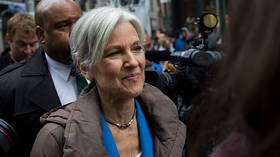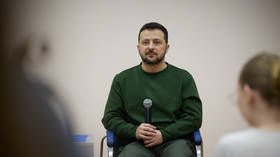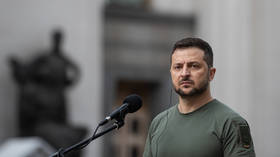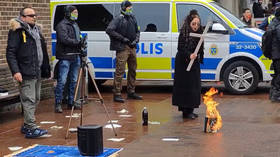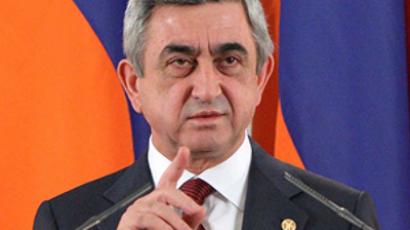Turkey warns US over Armenian “genocide” resolution
The US House of Representatives Foreign Affairs Committee has approved a resolution that recognizes the World War I-era deaths of Armenians in Ottoman-era Turkey as an act of “genocide”.
After hours of discussion, the House of Foreign Affairs Committee barely passed the resolution with a 23-22 vote that labels the murder of an estimated 1.5 million Armenians during World War I as genocide.
Immediately after the vote, Ankara recalled its ambassador from Washington, condemning the US Committee’s decision.
"We condemn this bill that blames the Turkish nation for a crime it did not commit. Our Washington ambassador was invited to Ankara tonight for consultations," Turkey's Prime Minister Tayyip Erdogan said in a statement.
Erdogan went on to warn that “Turkey will not be responsible for the negative results that this event may lead to,” saying that Washington’s decision will “harm Turkey-U.S. ties” and could derail talks aimed at opening the border between Turkey and Armenia.
Ankara sealed the border in 1993 to protest Armenia’s war with neighboring Azerbaijan.
Meanwhile, the Azerbaijani parliament has also voiced its objections to the resolution.
“Unfortunately, by this decision, the US has demonstrated its attitude towards the Turkic nations. I think that everybody, who considers himself a Turk, should react adequately and condemn the US Committee’s decision,” said Azerbaijani deputy Ganira Pashaeva. She added that “should take all necessary steps to stop the US Congress from adopting this resolution.”
Like the Turkish and Azerbaijan response, Armenia’s reaction didn’t come as a surprise. The Armenian Foreign Minister Edward Nalbandyan has praised the adoption of the resolution, saying that they “highly appreciate the decision” of the congressional panel. “This is further proof of the devotion of the American people to universal human values and is an important step towards the prevention of crimes against humanity," said Nalbandyan.
However, the Committee’s decision is only another step in recognizing the genocide.
The 23-22 vote now sends the measure to the full House of Representatives, where the prospects for passage are uncertain. In 2007 a similar notion was adopted by the Foreign Affairs Committee; however, it never made to the next level. After intense pressure by the Bush administration, who feared passage of the resolution would harm their war effort in the Middle East, the resolution was not brought to the House floor.
Despite US President Barack Obama’s vows during the 2008 presidential campaign to recognize the killings of Armenians as genocide, the White House had urged against the vote, fearing that it could anger Washington’s NATO ally, Turkey. However, last year at the annual White House statement on the day marking the Armenian remembrance, Obama also failed to call the killings a “genocide”.
US Secretary of State Hillary Clinton had urged the House committee not to vote, saying that it would damage reconciliation efforts between Turkey and Armenia. “We do not believe that the full Congress will or should act upon that resolution, and we have made that clear to all the parties involved,” Clinton advised lawmakers.
It’s estimated that up to 1.5 million Armenians were killed by the Ottoman Turks during World War I. Many historians call this the “first genocide of the 20th century.”
A number of countries – including Germany, Russia, Italy, France, Canada, Greece and most of the US states, as well as the Vatican, the European Parliament and the World Council of Churches have denounced the killings as genocide.
Turkey however, says the death toll has been inflated and those killed were the victims of civil war and unrest, denying that genocide had taken place. Ankara insists, in order for Armenia to have diplomatic and economic relations with Turkey, it should drop its claim for international recognition of genocide.
Olga Masalkova, RT



